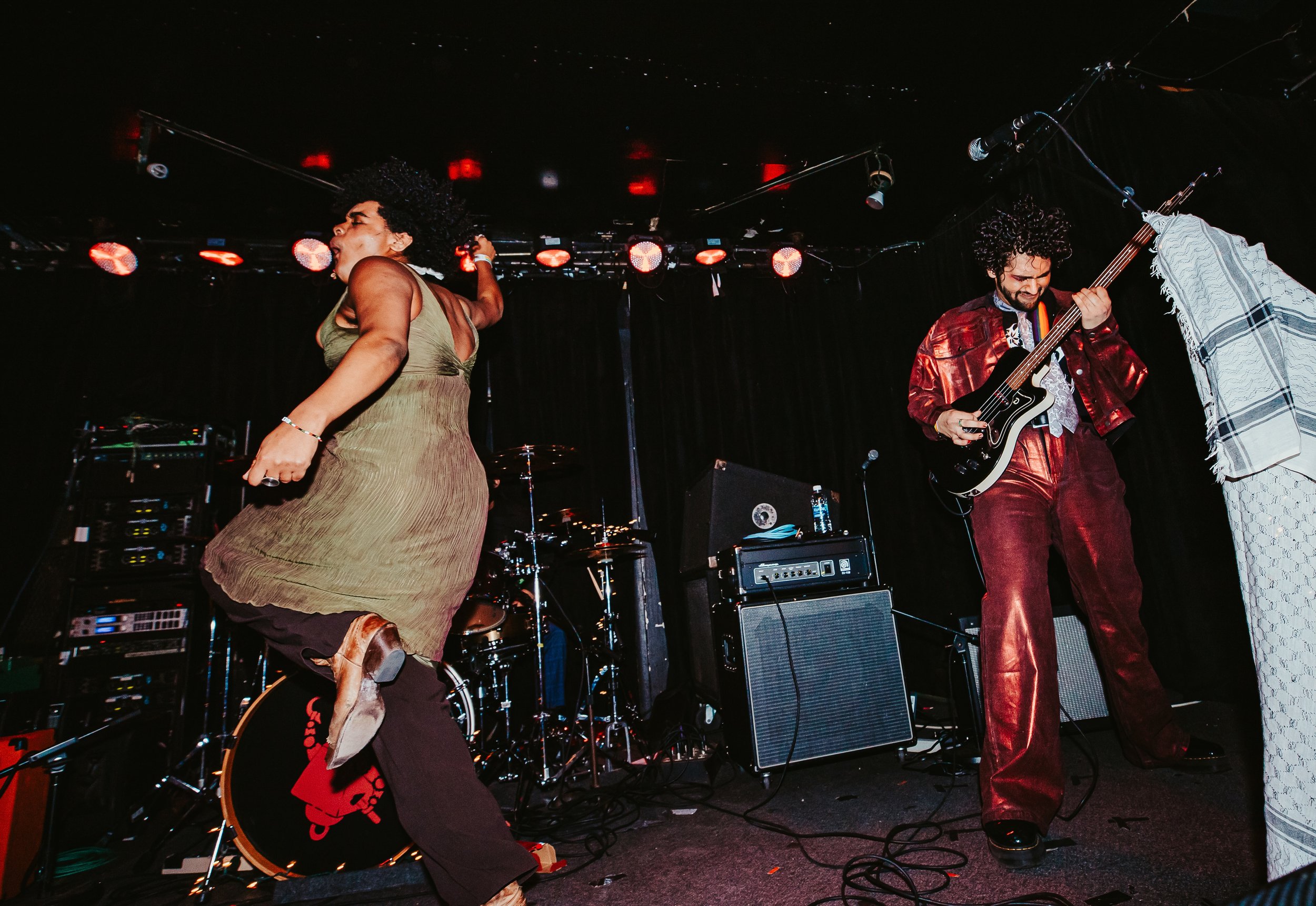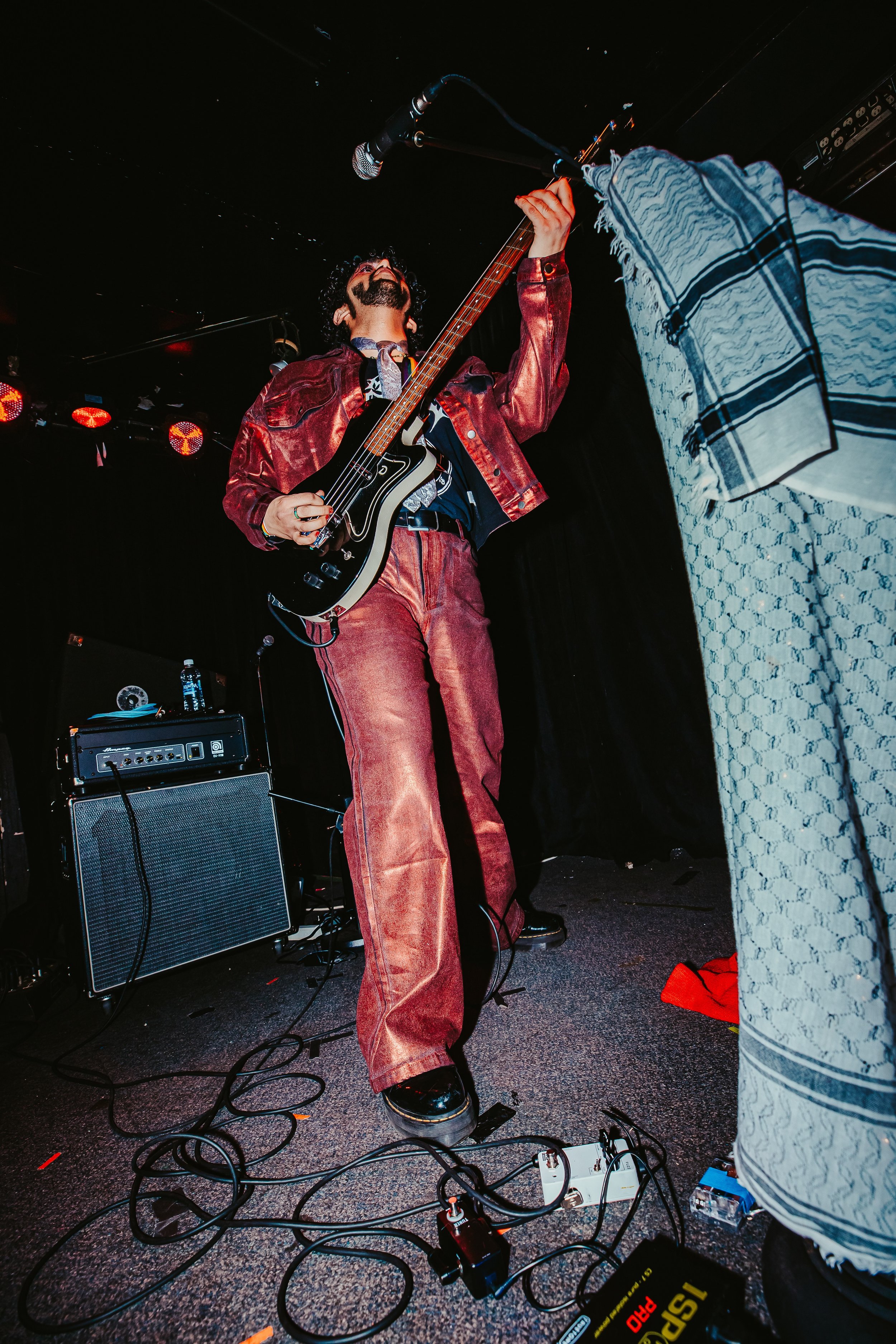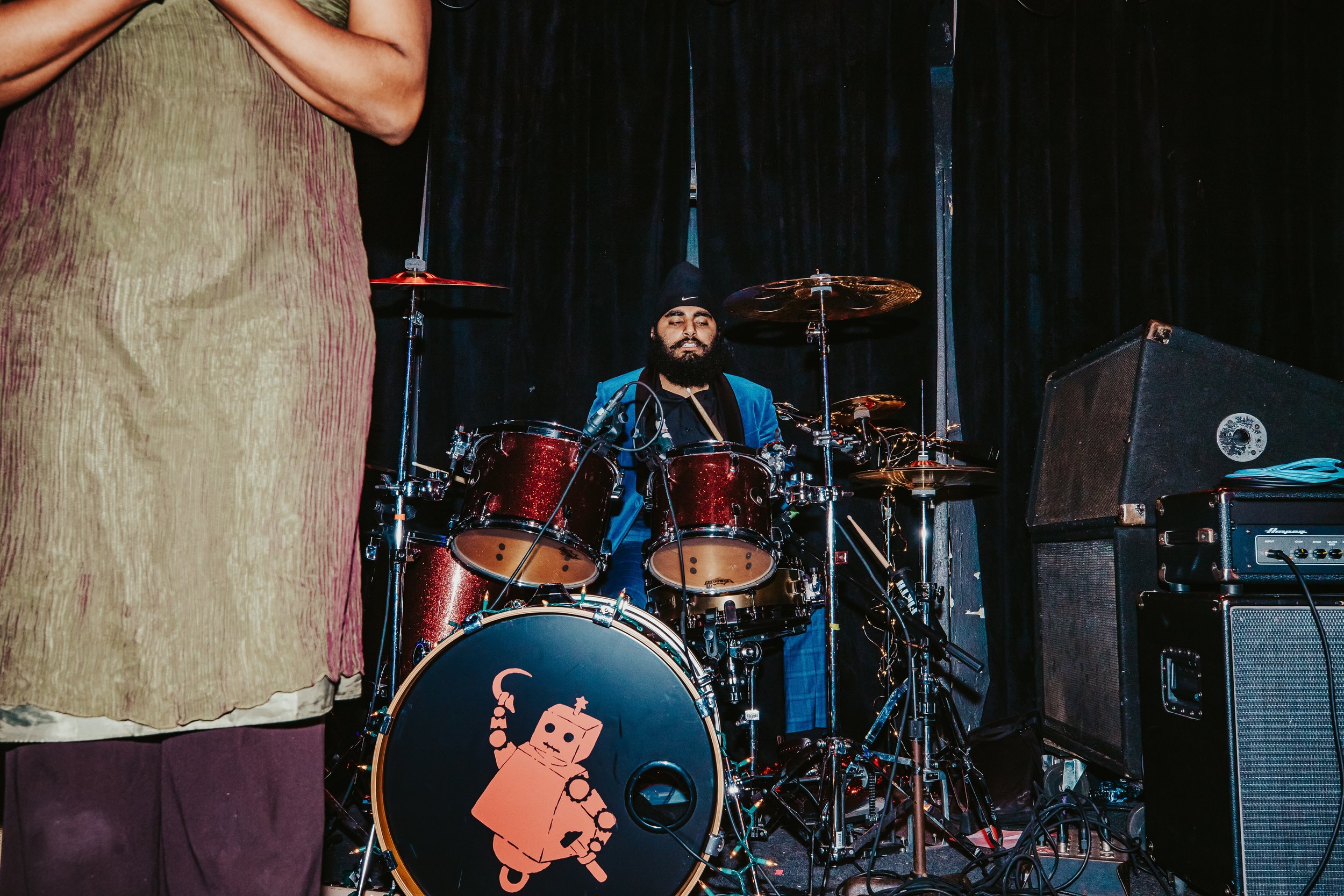DIY and the preservation of artistic agency: an interview with Directrix.
photo by Victoria Holda.
I couldn’t get them out of my head this winter break. Whether in the car or eating cereal alone in bed, “I Don’t” was on repeat. Lyrics like “Yell at me while you drive / Kiss me to apologize,” powerful belts, explosive guitar, and a grounding bass riff had me eager to speak with the three UChicago students behind Directrix. But the group is much more than a campus band—in fact, it’s wrong to even call them that; they’re a window into Chicago’s DIY scene and a beacon of hope for unfiltered, authentic, and community-based music in the time of growing record labors and music for fame’s sake.
Now comprised of Hamza Jilani (Bassist and backup vocals), Maatkara Wilson (Lead Singer), and Berk Ergoz (Lead Guitarist), the indie alt-punk band started in a Dubai high school with Ergoz cheating off of Jilani’s math homework. When the time came for parabolas, Jilani turned back to Ergoz and proclaimed that Directrix would be a cool band name, the two setting their path then and there.
photo by Victoria Holda.
Their first album, The Whale Album—spontaneously named for Jilani’s favorite animal—was written in high school “by some [teens] who were thinking about climate change” but released in 2023 once the band had coalesced at UChicago. With songs like “Buttermilk” and “Kerosene,” Directrix is characterized by bouncy baselines and witchy undertones. Through lines like “Why can’t I get my psyche started / It’s rubbing away” and “Play with me / Use me,” something haunted reaches out for you in The Whale Album. And though Ergoz says, “[they’ve] grown a lot as people and as a band since then,” the band still holds love for their early work. Jilani and Wilson enjoy the “whole” and “round” sounds produced by their collective voices. Ergoz has a whale tattooed on his arm.
From The Whale Album to “I Don’t,” and from their first gig at a student government party to serendipitously meeting Wilson when the band needed a singer, Directrix is self-made and ever-changing. Since The Whale Album, they’ve made a mark locally, performing at a variety of venues from Beat Kitchen to Cobb, releasing their new single “I Don’t,” and organizing Anti Riot Fest Fest with local bands and community members. It all feels like the right thing at the right time with the trio, because Directrix makes and performs music on their own terms.
The band attributes much of this freedom to the Chicago DIY scene, home to groups like Pinksqueeze and Scarlet Demore and characterized by experimental, live performances in unconventional locations. Finding home in the DIY scene, Directrix makes music that sounds like them without the hindrance of producers and record labels. So whether performing in a local basement with a trampoline in the backyard or at more established venues like Sub T or Book Club, Directrix “[gets] to decide, what [their] music sounds like and who [they] want to play to.” There’s no pressure to “get big” and turn performing into a full-time gig. For Directrix, the only pressure is “making music… and learning more about each other.”
And even though they’re externally unedited, the band has still “evolved from a pretty cool canon of anti-racist & anarchically aligned bands like Rage Against the Machine.” Thankful for their predecessors, Directrix’s music and social work strive for “overt lyricism and ownership of political bodies.” Though they create from a different perspective than Rage Against the Machine or Jilani’s mention, film director and activist Boots Riley, they take from them the refusal to be misinterpreted and co-opted. “[We’d] still [be] struggling for the future,” Wilson says, “but in a different way, and we’re lucky to have this medium & history.”
photo by Victoria Holda.
It’s a sweet freedom embedded in the DIY, the self-made, and the history of anti-establishment music. In a recent career workshop for UChicago students, Warner Records repeatedly reassured us that they prioritized the artist’s vision. But they also joked about making the Red Hot Chilli Peppers do TikToks and asking artists to shorten songs for movies. Though artistry seemingly holds more weight than management now (something that could also be heavily debated), performers tied to agencies can’t avoid marketing and necessary publicity stunts. Without this oversight, Directrix can be loud and uncensored. “There is no Directrix TikTok,” Ergoz says with relief. The band finds comfort in the DIY scene, in the small but loud, in the unmanaged. Their sound, message, and pride can’t be diminished or compromised, imbuing their music with a raw authenticity. The Whale Album and “I Don’t” are made by artists who want to be making music for music’s sake. Their art is entirely theirs.
And though participating in the DIY scene often comes at the cost of UChicago performance spaces, the trio says they don’t mind the split. Wilson explained that the DIY scene allows the band to play in spaces that feel good for both performer and listener: “It’s cool being able to play on a college campus, but it’s not cool playing at a place that hurts and marginalizes people. Being in the Chicago scene feels like you’re connecting to people. UChicago is just a place with boundaries, and you leave them hopefully.” In other words, UChicago shapes an artist; Chicago allows artists to shape their space. At a Directrix performance, there’s never a moment where “people are playing pool and chatting.” Instead, Ergoz is jumping over Jilani while Wilson belts a high note—an energy you can’t have as a campus band, says Ergoz.
The joy of this untamed energy and authenticity is that anyone can experience it up close. In the age of parasocial relationships and forced artist relatability, small bands like Directrix find community within themselves and at local performances. Internally, the band isn’t hierarchical. They banter as friends. Ergoz assures me that “All [their] best stuff always comes when [they’re working] together.” And externally, with the band playing when and where they want to, they find themselves in good company, talking to new friends before and after gigs, getting invited to someone’s big green school bus or home to see the chinchillas. Directrix is on the ground and real. There’s a tangibility to their group and music that makes you want to reach out and be a part of it. The best part is that you can.
photo by Victoria Holda.
Community, after all, is the ultimate goal. For Wilson, artistry necessitates collapsing the individual and the communal: “I feel like being an artist with people and being an artist by myself are different things. I try to bring both into all of my creations.” So whether standing with West Side residents at the Anti Riot Riot Fest, publicly standing for a Free Palestine, or performing at the Divestival, Directrix makes music with unity in mind, motivating listeners to “[organize] together and own [their] power with others.”
There is something so big and industrialized about art now, but Directrix gives me hope. Sure, Ergoz’s end goal is to play at Lollapalooza—Jilani wants a Directrix song to play every time you open a fridge; Wilson wants to play in non-fascist countries—but there is a collective refusal to be minimized, appropriated by record labels, or misinterpreted. So with The Whale Album behind them, I can’t wait for what’s next for Directrix. And though they’ve written and performed a host of new songs, the band only wants to release their music when it’s ready. Whether next week or next year—mainly when “it all sounds right”—Directrix could put out an EP or completely “[blow] up the whole album structure,” which might mean a VHS, cassette, or just releasing on SoundCloud and calling it a day, knowing “it would be just as fulfilling and worth listening to as being on a major platform.” That’s the beauty of the DIY scene and the wonder of Directrix.
Here’s some parting advice from the artists:
Ergoz: “Find people to play with.” He corrects himself: “Well, find people who you like to play with and make music with people you like. Play live often so you can get better at playing live.”
Wilson: “Take your time. Your life is not over by the time you’re 25… Make your goals worth your soul’s work. Because at the end of the day, that's what this shit is. And you want your soul to feel good.”
Jilani: “Don’t take yourself too seriously… Get to know your people and your community.”
edited by Aidan Burt.
photos by Victoria Holda.




